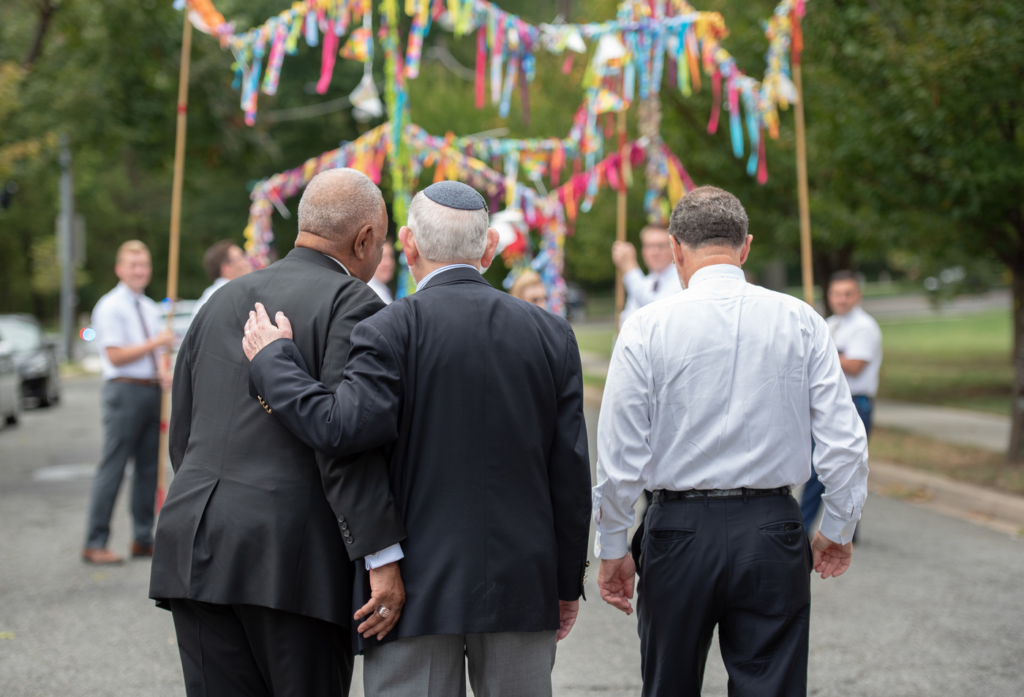Interview with Cardinal Wilton D. Gregory, Archbishop of Washington, who will be our speaker for the John Paul II Annual Lecture on Interreligious Understanding on March 31 (more information and registration here)

Photo: Then-Archbishop Wilton Gregory, left, participates in the Sept. 8, 2019 Unity Walk sponsored by the Interfaith Council of Metropolitan Washington (D.C.), walking with Rabbi Gerald Serotta, center, the council’s executive director, and Rabbi Bruce Lustig, right, the senior rabbi at Washington Hebrew Congregation. (Catholic Standard photo/Andrew Biraj)
Your Eminence, in your ministry you have been and you are tackling a number of issues especially related to racial and social justice. Do you see the commitment to interreligious and ecumenical dialogue, particularly Catholic-Jewish dialogue, as part of this effort? If so how?
As you may know, I am the Catholic co-chair of the ongoing dialogue between the US Conference of Catholic Bishops and the National Council of Synagogues. In our current round of the dialogue, we are examining whether the lessons learned from Catholic-Jewish dialogue over the past several decades could be used to assist in dealing with issues relating to race relations in this country at this time.
The principles that are essential to any fruitful dialogue – including patient listening, mutual respect for the other as other, genuine friendship, and mutual support in difficult times, among others – are principles that are helpful in working for racial and social justice too.
Before we considered this topic, the dialogue also included the topic of immigration and care for people at the borders of our nation. The members of the dialogue are planning to visit Atlanta and other locations of importance to the civil rights movement in the southern part of the country in the coming months. Issues of racial justice concern us as Catholics and Jews because they are an affirmation of our understanding of human beings as being created in the image and likeness of God. This is a fundamental part of our beliefs, and interreligious dialogue lends itself towards this end.
During your lecture you will be talking about past, present and future of Catholic-Jewish relations: could you tell us one learning point from the past, one challenge of the present and one hope for the future?
I would say that one starting point from the past from the Catholic point of view would be the promulgation of Nostra Aetate at the Second Vatican Council. History has taught us of the importance of strongly condemning any forms of anti-semitism, which Nostra Aetate clearly did.
For the present, a challenge would be the continuing presence of anti-semitism in the United States, as we have seen over the past too many months. These are continuing reminders that our work together in combating anti-semitism is not yet finished.
A hope for the future would be that unlike our unfortunate past, we are going into the future together as sisters and brothers. Even though there will be challenges, we know that we will be together and that we can support each other with whatever challenges present themselves.
What do you think is the specificity of Catholic-Jewish relations in the United States compared to other countries?
While I am not able to speak about Catholic-Jewish relations in other countries, I can say that since the promulgation of Nostra Aetate by the Second Vatican Council in 1965, the Catholic Church worldwide has sought to dialogue with our Jewish brothers and sisters.
In the United States, the Catholic Church has had a history since that time of dialogue with our Jewish neighbors at the national, regional, and local levels. This dialogue, while not always easy, has resulted in genuine friendships being established, a greater understanding and respect for each other, and a willingness to accompany each other in the challenges that we face. We have an irrevocable relationship now, firmly rooted in both our history and our present and to carry it forth into our future so that we will support each other and be there for each other going forward.
I have been part of Catholic-Jewish dialogues for decades, and have found it to be enriching and enlightening personally and spiritually. I value my relationships with my Jewish brothers and sisters.
In the United States, which has the largest Jewish population outside of Israel, the relationship of the Catholic Church with our Jewish partners is very important. The American context of multiculturalism and religious pluralism also contributes to the need for people of any faith to want to know and work with their neighbors. Specific to the American context, the U.S. Conference of Catholic Bishops has released a number of documents regarding various items that have been the fruits of our dialogues. These include: Catholic school teaching on the Shoah, Depictions of the Passion of Christ, and the presentation of Jews and Judaism in Catholic preaching. These are examples of how Catholic-Jewish dialogue in the American context has produced mutual understanding and friendship between Catholics and Jews.
How did you get involved into Catholic-Jewish dialogue?
I was invited to participate in these dialogues initially through the good offices of the late Cardinal William Keeler, who was himself a pioneer and important voice in developing Jewish-Catholic dialogue. I was honored that he asked me to continue and try to advance this work in which he himself had taken such an important role and was such an important figure in the American context.
During these years I’ve been blessed with several Jewish friendships that I have been able to establish, develop and advance through this dialogue. It’s no longer simply a professional relationship, which is critical, but it’s a personal friendship which I think it is enduring and spiritually enriching for all sides.
